 Backend Development
Backend Development
 Python Tutorial
Python Tutorial
 Inventory of advanced usage of Python built-in function sorted()
Inventory of advanced usage of Python built-in function sorted()
Inventory of advanced usage of Python built-in function sorted()
1. Preface
A few days ago in the Python diamond exchange group, a fan named [emerson] asked a question about Python sorting. I will share it with you and learn together.
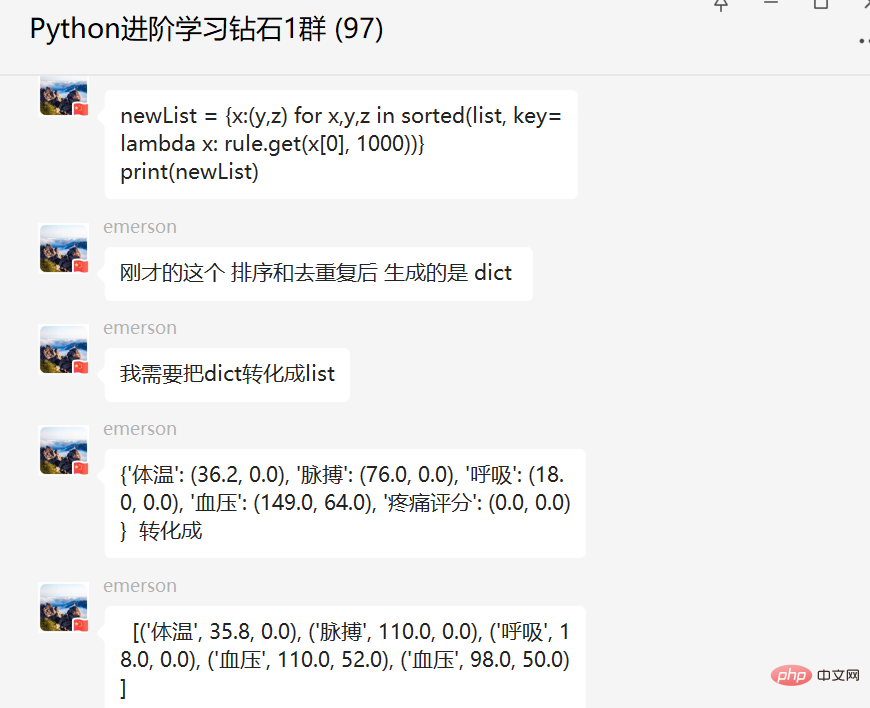
In fact, [Teacher Yu Liang], [Eternity in Budapest] and others have talked a lot here, but it is still a bit confusing for friends who are not very good at basics. hard. However, the built-in function sorted() is still used a lot in practical applications. I will talk about it here separately. I hope that next time friends encounter it, they will not panic.
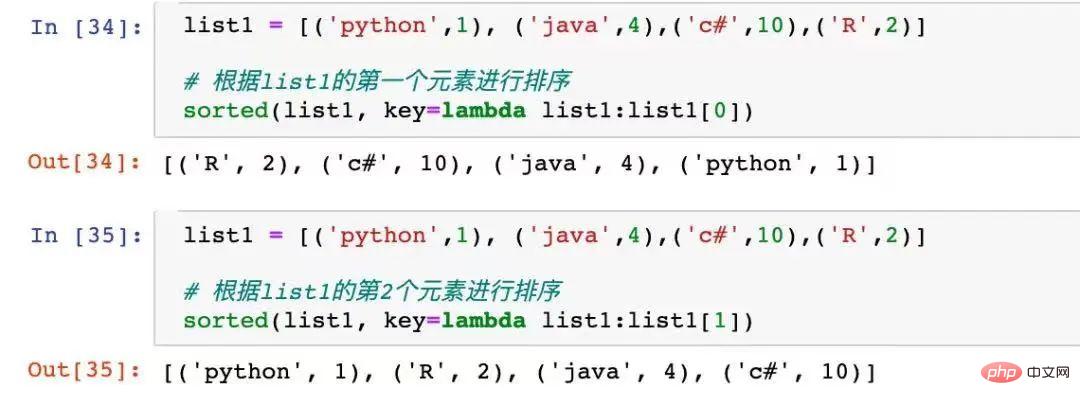
2. Basic Usage
The built-in function sorted() can be used for sorting. The basic usage is very simple. Take an example, as shown below.
lst = [3, 28, 18, 29, 2, 5, 88]result = sorted(lst)print(result)
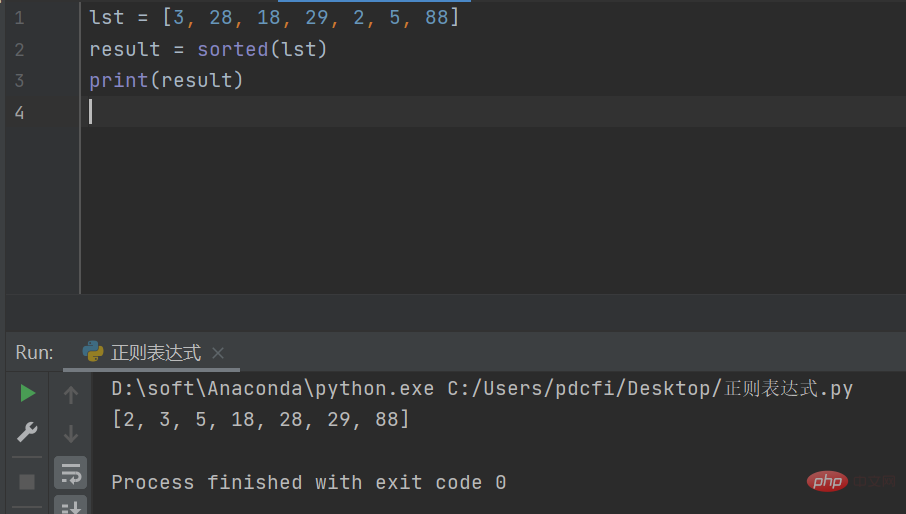
Program running After that, you can see that the list is sorted in ascending order from small to large.
If you want it to be sorted in reverse order, it is also very simple, just add a reverse parameter.
lst = [3, 28, 18, 29, 2, 5, 88]result = sorted(lst, reverse=True)print(result)
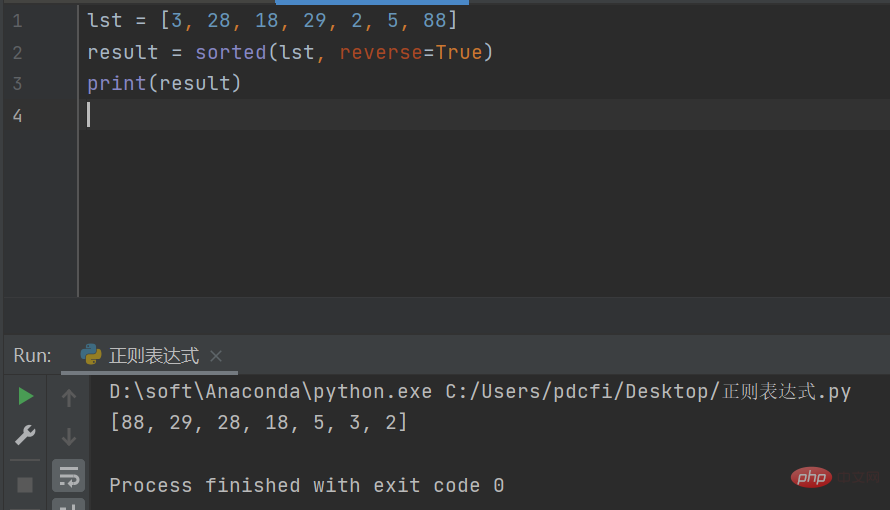
3. Advanced Usage
The list (iterator) we encountered above is a very simple numeric type. If we encounter a more complex iterator and need to sort it, such as the following example , as follows:
lst = [ {"id": 1, "name": "Luban", "age": 18}, {"id": 2, "name": "Master Luban", "age": 26}, {"id": 3, "name": "Master Lu", "age": 23}, {"id": 4, "name": "Di Renjie", "age": 48 }]# Sort heroes according to age, in ascending order
If you want to sort an iterator or iterable object like this, you need to use a custom method to sort it. This can also be done using the built-in function sorted(). The usage of sorted() is as follows.
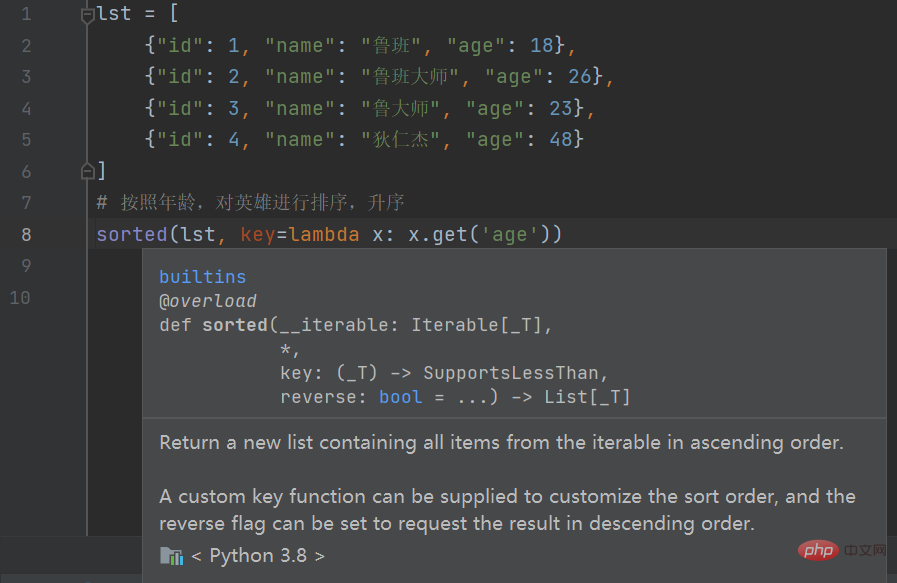
It has three parameters in total. The first parameter is an iterable object, such as a list, dictionary, set, etc.; the second parameter refers to the sorting rule (sort function), inside sorted(), each element in the iterable object will be passed to the parameter of this function, and sorted according to the result of the function operation; the third parameter is reverse, if it is True, it means reverse order, if it is False, then Indicates positive sequence.
Then for this question, you can use the following code to sort:
sorted(lst, key=lambda x: x.get('age'))The key is a self-defined anonymous function used to specify the sorting rules. Here, it is taken from the dictionary age, and then sort according to the age size, so the result is as shown in the figure below.

What should I do if I want to remove a hero who is older than 28?
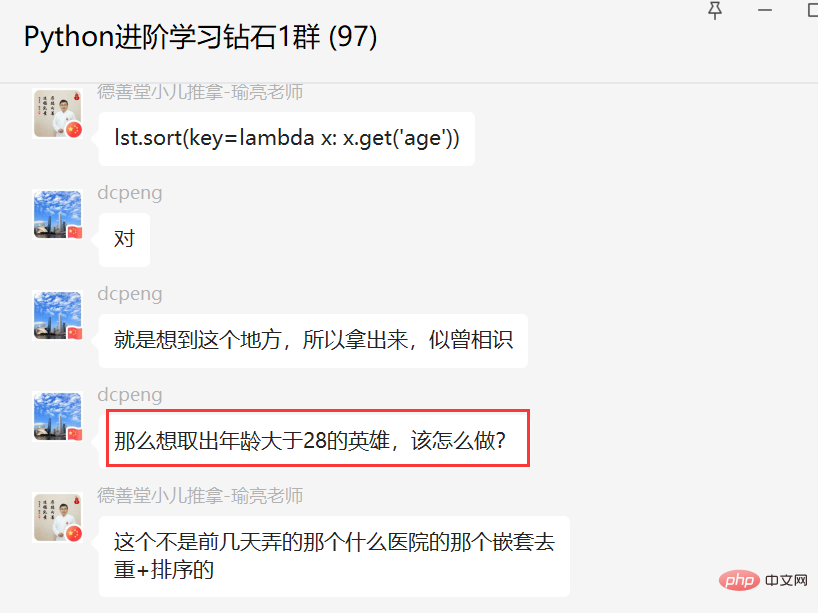
This is an extension, it is also possible Use built-in functions to do it, except that the built-in function used here is filter(). The code is as follows:
list(filter(lambda x: x['age'] >= 28, lst))
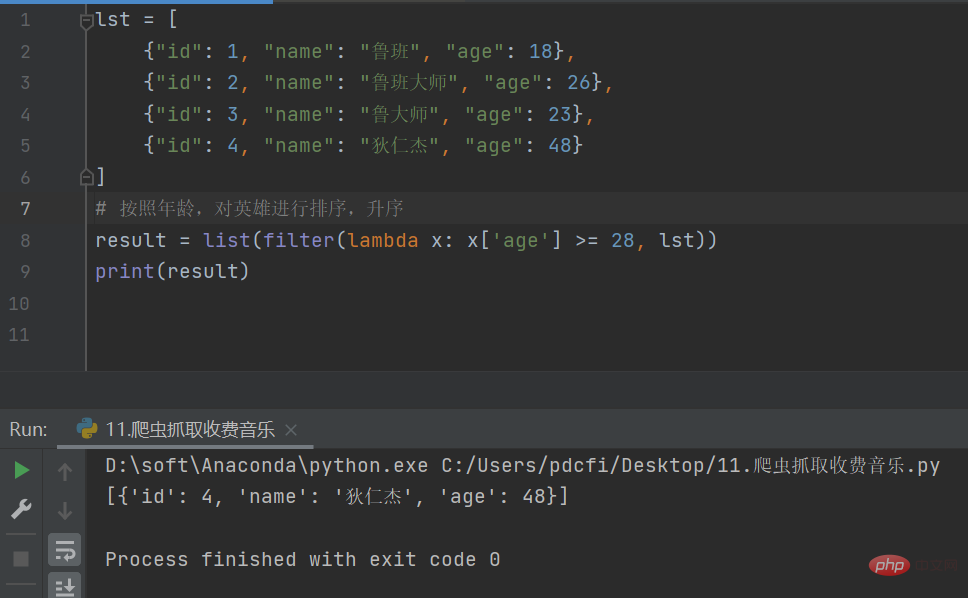
Extras
Recently, many friends are asking about knowledge points about deep and shallow copying of Python. I compiled a piece of information yesterday and share it with you. I am often asked about it during interview questions, so let’s encourage each other.
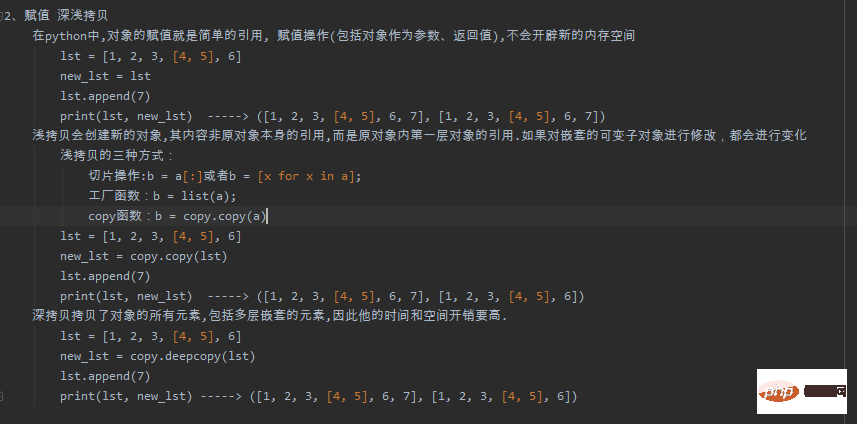
3. Summary
Hello everyone, I am a Python advanced user. This article mainly shares the sorting problem of Python's built-in function sorted(), and provides specific analysis and code demonstrations to help fans solve the problem smoothly.
The above is the detailed content of Inventory of advanced usage of Python built-in function sorted(). For more information, please follow other related articles on the PHP Chinese website!

Hot AI Tools

Undresser.AI Undress
AI-powered app for creating realistic nude photos

AI Clothes Remover
Online AI tool for removing clothes from photos.

Undress AI Tool
Undress images for free

Clothoff.io
AI clothes remover

Video Face Swap
Swap faces in any video effortlessly with our completely free AI face swap tool!

Hot Article

Hot Tools

Notepad++7.3.1
Easy-to-use and free code editor

SublimeText3 Chinese version
Chinese version, very easy to use

Zend Studio 13.0.1
Powerful PHP integrated development environment

Dreamweaver CS6
Visual web development tools

SublimeText3 Mac version
God-level code editing software (SublimeText3)

Hot Topics
 PHP and Python: Different Paradigms Explained
Apr 18, 2025 am 12:26 AM
PHP and Python: Different Paradigms Explained
Apr 18, 2025 am 12:26 AM
PHP is mainly procedural programming, but also supports object-oriented programming (OOP); Python supports a variety of paradigms, including OOP, functional and procedural programming. PHP is suitable for web development, and Python is suitable for a variety of applications such as data analysis and machine learning.
 Choosing Between PHP and Python: A Guide
Apr 18, 2025 am 12:24 AM
Choosing Between PHP and Python: A Guide
Apr 18, 2025 am 12:24 AM
PHP is suitable for web development and rapid prototyping, and Python is suitable for data science and machine learning. 1.PHP is used for dynamic web development, with simple syntax and suitable for rapid development. 2. Python has concise syntax, is suitable for multiple fields, and has a strong library ecosystem.
 PHP and Python: A Deep Dive into Their History
Apr 18, 2025 am 12:25 AM
PHP and Python: A Deep Dive into Their History
Apr 18, 2025 am 12:25 AM
PHP originated in 1994 and was developed by RasmusLerdorf. It was originally used to track website visitors and gradually evolved into a server-side scripting language and was widely used in web development. Python was developed by Guidovan Rossum in the late 1980s and was first released in 1991. It emphasizes code readability and simplicity, and is suitable for scientific computing, data analysis and other fields.
 Python vs. JavaScript: The Learning Curve and Ease of Use
Apr 16, 2025 am 12:12 AM
Python vs. JavaScript: The Learning Curve and Ease of Use
Apr 16, 2025 am 12:12 AM
Python is more suitable for beginners, with a smooth learning curve and concise syntax; JavaScript is suitable for front-end development, with a steep learning curve and flexible syntax. 1. Python syntax is intuitive and suitable for data science and back-end development. 2. JavaScript is flexible and widely used in front-end and server-side programming.
 Can vs code run in Windows 8
Apr 15, 2025 pm 07:24 PM
Can vs code run in Windows 8
Apr 15, 2025 pm 07:24 PM
VS Code can run on Windows 8, but the experience may not be great. First make sure the system has been updated to the latest patch, then download the VS Code installation package that matches the system architecture and install it as prompted. After installation, be aware that some extensions may be incompatible with Windows 8 and need to look for alternative extensions or use newer Windows systems in a virtual machine. Install the necessary extensions to check whether they work properly. Although VS Code is feasible on Windows 8, it is recommended to upgrade to a newer Windows system for a better development experience and security.
 How to run sublime code python
Apr 16, 2025 am 08:48 AM
How to run sublime code python
Apr 16, 2025 am 08:48 AM
To run Python code in Sublime Text, you need to install the Python plug-in first, then create a .py file and write the code, and finally press Ctrl B to run the code, and the output will be displayed in the console.
 Can visual studio code be used in python
Apr 15, 2025 pm 08:18 PM
Can visual studio code be used in python
Apr 15, 2025 pm 08:18 PM
VS Code can be used to write Python and provides many features that make it an ideal tool for developing Python applications. It allows users to: install Python extensions to get functions such as code completion, syntax highlighting, and debugging. Use the debugger to track code step by step, find and fix errors. Integrate Git for version control. Use code formatting tools to maintain code consistency. Use the Linting tool to spot potential problems ahead of time.
 Where to write code in vscode
Apr 15, 2025 pm 09:54 PM
Where to write code in vscode
Apr 15, 2025 pm 09:54 PM
Writing code in Visual Studio Code (VSCode) is simple and easy to use. Just install VSCode, create a project, select a language, create a file, write code, save and run it. The advantages of VSCode include cross-platform, free and open source, powerful features, rich extensions, and lightweight and fast.





